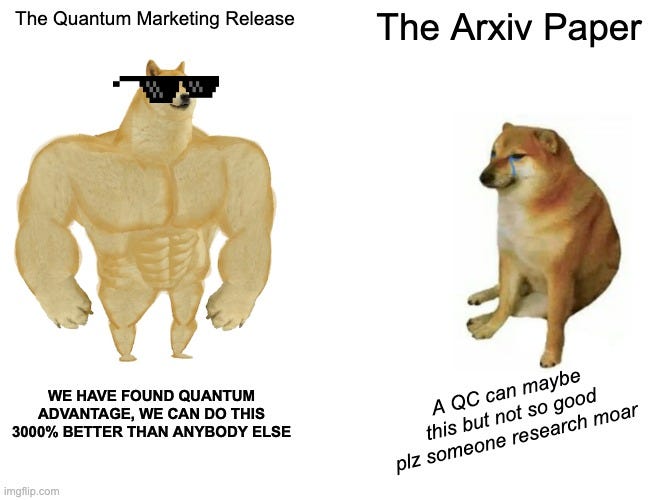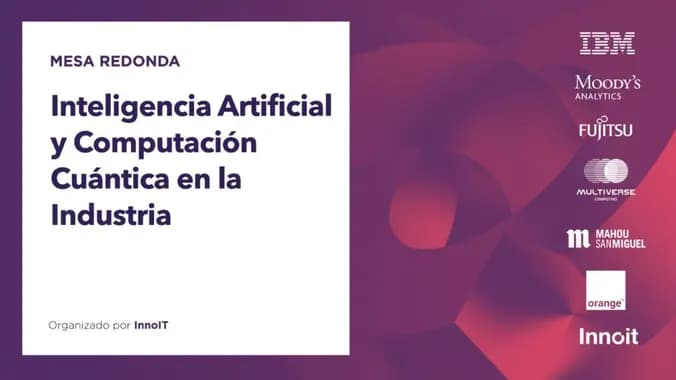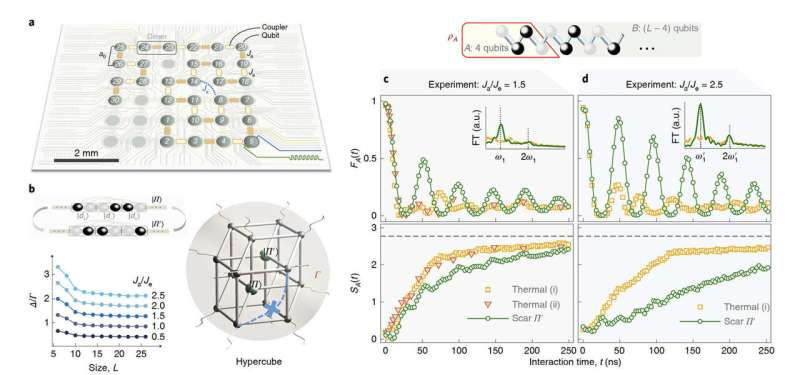The Week in Quantum Computing - October 17th
Issue #109
The Week in Quantum Computing. Brought to you by Sergio Gago (@piratecto).
Quick Recap
I have decided to send this on Sunday because a) The Newsletter is packed, and b) It is packed with research papers that are very unique in their own way. So grab your coffee, pen and paper and get ready to read some math.
NATO kicks off their quantums strategy, great video from Marco Pistoia showcasing JPM achievements so far, and a breakthrough on using QAOA algorithm on a trapped ion computer. Hamburg secures funding to build a quantum network. Meanwhile Poland and Spain (BSC in Barcelona) secure a spot for the European “public” computers. Meanwhile in Geneva GESDA creates the Open Quantum Institute. A fantastic interview with John Martinis and the first approach for a post-quantum secure credit card by Mastercard. And two papers that won’t go unnoticed, read below for the memes.
The Quantum Meme
A couple of days ago, a fantastic piece of research has been published in Arxiv by the research team of Los Alamos National Lab. On the Emerging Potential of Quantum Annealing Hardware for Combinatorial Optimization
"We demonstrate that classes of contrived problems exist where this quantum annealer can provide run time benefits over a collection of established classical solution methods that represent the current state-of-the-art for benchmarking quantum annealing hardware"
The benchmark itself is a piece of art and the paper shows a bright future for quantum annealing technology. That is one of the reasons we are researching and working with it.
However, many comments claim "Orders of magnitude faster than any classical alternative for commercial problems"
Do you see any problem here?
Let's just continue with the abstract:
"Although this work does not present strong evidence of an irrefutable performance benefit for this emerging optimization technology, it does exhibit encouraging progress, signaling the potential impacts on practical optimization tasks in the future"
And if we read INSIDE the paper
"Limitations of This Study: The foremost limitation of this work is that it considers Ising models that are hardware-native. Such models provide best-case scenarios for QA hardware and, thus far, have not reflected sparsity patterns of realistic combinatorial optimization tasks. Although this work demonstrates an important necessary condition for having a performance benefit on practical problems, it is not a sufficient condition. Benchmarking real-world problems is required to show that these benefits can be also realized in that context.”
Look, I want to see quantum advantage as much as anybody else. But it is time to get the press releases closer to the scientific claims. (The Linkedin post got some traction!)
On Encoding Data
I wanted to showcase this paper because of its importance, partially related to the point above. Sometimes we forget the times when we had to optimize the floating point on our arithmetic calculations in classical computers (EEPROM coding, use assembler to save bytes from inefficient C libraries, etc). But the #quantumComputing world brings us back there.
In this paper AWS and Goldman Sachs researchers discuss some of the resources needed to perform block-encoding of classical data. I.e. How do you encode a matrix into a quantum computer.
For that you need mainly three things: Number of qubits (usually most people stop here), clock speed (how quickly you can perform operations) and circuit depth (how many gates you need to add to, say, encode a probability distribution, very relevant considering each additional gate can increase the cumulative errors).
I find this work amazing and right on time, to keep researching on one of the problems many people ignore. The before and the after in the algorithm. How do we encode our classical information in a quantum circuit.
Coming Events
Anybody attending Money2020? If so, we will talk about Quantum for finance. Drop me a line to get an invitation to a private event we are organizing!
And if you happen to be in Madrid, please join us this wednesday together with an epic panel of experts to talk about AI and Quantum Computing.
The Week in Quantum Computing
Paper: Universal Quantum Speedup for Branch-and-Bound, Branch-and-Cut, and Tree-Search Algorithms
Mixed Integer Programs (MIPs) model many optimization problems of interest in Computer Science, Operations Research, and Financial Engineering. Solving MIPs is NP-Hard in general, but several solvers have found success in obtaining near-optimal solutions for problems of intermediate size. Branch-and-Cut algorithms, which combine Branch-and-Bound logic with cutting-plane routines, are at the core of modern MIP solvers. Montanaro proposed a quantum algorithm with a near-quadratic speedup compared to classical Branch-and-Bound algorithms in the worst case, when every optimal solution is desired. In practice, however, a near-optimal solution is satisfactory, and by leveraging tree-search heuristics to search only a portion of the solution tree, classical algorithms can perform much better than the worst-case guarantee. In this paper, we propose a quantum algorithm, Incremental-Quantum-Branch-and-Bound, with universal near-quadratic speedup over classical Branch-and-Bound algorithms for every input, i.e., if classical Branch-and-Bound has complexity Q on an instance that leads to solution depth d, Incremental-Quantum-Branch-and-Bound offers the same guarantees with a complexity of Õ (Q‾‾√d). Our results are valid for a wide variety of search heuristics, including depth-based, cost-based, and A∗ heuristics. Universal speedups are also obtained for Branch-and-Cut as well as heuristic tree search. Our algorithms are directly comparable to commercial MIP solvers, and guarantee near quadratic speedup whenever Q≫d. We use numerical simulation to verify that Q≫d for typical instances of the Sherrington-Kirkpatrick model, Maximum Independent Set, and Portfolio Optimization; as well as to extrapolate the dependence of Q on input size parameters. This allows us to project the typical performance of our quantum algorithms for these important problems.
Link: https://ift.tt/gcKQbr1
October 10, 2022 at 07:30AM
When is the right time for quantum computer makers to explore error correction?
Quantum computers are highly susceptible to errors that must be addressed in order for the computers to perform useful computations. Quantum Error Correction, a system of software and hardware that diagnoses and resolves errors — overcomes this challenge, producing high-fidelity logical qubits that are suitable for building large-scale applications.
Link: https://ift.tt/uXU0Fwg
October 10, 2022 at 08:30PM
The coherent simulation of a quantum phase transition in a programmable 2,000 qubit Ising chain
Researchers at D-Wave Systems and various institutes in Canada, the U.S. and Japan have recently simulated a quantum phase transition in a programmable 2,000 qubit 1D quantum Ising model. Their results, presented in a paper published in Nature Physics, could inform future quantum optimization and simulation efforts.
Link: https://ift.tt/kVSHxy9
October 10, 2022 at 10:30PM
BSC, selected to host one of the first European quantum computers
This milestone is one of the first results of the Quantum Spain program, promoted by the Spanish Government through the State Secretariat for Digitalization and Artificial Intelligence, and allows reinforcing the European leadership of the national Quantum Computing ecosystem, attracting an infrastr
Link: https://ift.tt/AyJx34d
October 11, 2022 at 04:30AM
What, exactly, is a photon?
The photon might be the most familiar of elementary particles. Traveling at the speed of light, the particles bombard us daily from the sun, moon, and stars. For more than a century, scientists and engineers have harnessed them in aggregate to illuminate our cities and now, our screens.
Link: https://ift.tt/pBi9ozq
October 11, 2022 at 09:30AM
Mastercard and partners deliver first contactless cards for quantum world
The protections and purchasing power of contactless payments took a step forward as Mastercard announced the approval of the first cards for issuers that are compatible with the new EMVCo® contactless specifications designed to protect against attacks from both traditional and quantum computers.
Link: https://ift.tt/w53bVeG
October 11, 2022 at 04:30PM
Four reasons why your organization should invest in quantum technologies
While quantum technologies have been around for a few decades, the latest developments – which actively use quantum properties of subatomic particles – are nothing short of spectacular.
Link: https://ift.tt/vmXM286
October 12, 2022 at 07:30AM
Quantum Interview with Professor John Martinis
And the goal is set out: Create a million qubits by the end of the decade! And what will a million qubits allow us to do?
Link: https://ift.tt/n95dGCp
October 12, 2022 at 09:30AM
Paper: On the Emerging Potential of Quantum Annealing Hardware for Combinatorial Optimization
Over the past decade, the usefulness of quantum annealing hardware for combinatorial optimization has been the subject of much debate. Thus far, experimental benchmarking studies have indicated that quantum annealing hardware does not provide an irrefutable performance gain over state-of-the-art optimization methods. However, as this hardware continues to evolve, each new iteration brings improved performance and warrants further benchmarking. To that end, this work conducts an optimization performance assessment of D-Wave Systems' most recent Advantage Performance Update computer, which can natively solve sparse unconstrained quadratic optimization problems with over 5,000 binary decision variables and 40,000 quadratic terms. We demonstrate that classes of contrived problems exist where this quantum annealer can provide run time benefits over a collection of established classical solution methods that represent the current state-of-the-art for benchmarking quantum annealing hardware. Although this work does not present strong evidence of an irrefutable performance benefit for this emerging optimization technology, it does exhibit encouraging progress, signaling the potential impacts on practical optimization tasks in the future.
Link: https://ift.tt/fGZlVRb
October 12, 2022 at 11:30AM
The European automobile industry is going quantum
It’s a bold new world for automobile makers. After a century of development and fine-tuning, the combustion engine is going the way of the dodos as Europe shifts to clean energy. But there’s more to the future of cars than just electric motors. The onset of fully autonomous vehicles may lie just beyond the technological horizon and the promise of a million-mile battery draws ever closer. In order to navigate the road to these technologies, European automakers are partnering with quantum computing companies at an increasing pace.
Link: https://ift.tt/1zjl7pZ
October 12, 2022 at 12:30PM
Strangeworks supports the creation of the Open Quantum Institute (OQI)
GESDA is working to create an Open Quantum Institute (OQI) in Geneva with the goal of making quantum computing technology more accessible to developers around the world.
Link: https://ift.tt/9HOSmDy
October 12, 2022 at 09:30PM
Hamburg University secures EUR 1 million for quantum network
Our newsletters regularly provide extensive news and background information on projects and current developments of the international business location Hamburg and its business clusters.
Link: https://ift.tt/XmcxI8f
October 12, 2022 at 09:30PM
Important breakthrough in quantum computing could lead to more efficient batteries and solar cells
The findings, published in Nature Communications today, describes how the team has taken an important first step towards using quantum computers to determine low-energy properties of strongly-correlated electronic systems that cannot be solved by classical computers.
Link: https://ift.tt/X19CM7A
October 12, 2022 at 09:30PM
JPMorgan Chase Bets Big on Quantum Computing
Most talk about quantum computing today, at least in HPC circles, focuses on advancing technology and the hurdles that remain. There are plenty of the latter. Financial services giant JPMorgan Chase (JPMC) takes a different, distinctly user perspective, generally steering clear of the qubit technology battles and instead focusing on becoming being quantum-ready now. Quantum information science, believes JPMC, isn’t a nice-to-learn area but a must-learn. QIS will upend many existing practices and introduce new ones.
Link: https://ift.tt/0WLonRs
October 13, 2022 at 07:30AM
Physicists reach qubit computing breakthrough
Researchers from Arizona State University and Zhejiang University in China, along with two theorists from the United Kingdom, have been able to demonstrate for the first time that large numbers of quantum bits, or qubits, can be tuned to interact with each other while maintaining coherence for an unprecedentedly long time, in a programmable, solid state superconducting processor.
Link: https://ift.tt/mUTDbBC
October 13, 2022 at 09:30PM
Constrained quantum optimization for extractive summarization on a trapped-ion quantum computer
Realizing the potential of near-term quantum computers to solve industry-relevant constrained-optimization problems is a promising path to quantum advantage. In this work, we consider the extractive summarization constrained-optimization problem and demonstrate the largest-to-date execution of a quantum optimization algorithm that natively preserves constraints on quantum hardware. We report results with the Quantum Alternating Operator Ansatz algorithm with a Hamming-weight-preserving XY mixer (XY-QAOA) on trapped-ion quantum computer.
Link: https://ift.tt/xXskqdK
October 14, 2022 at 10:30AM
Automatic Design of Quantum Algorithms
In order to solve hard computational problems, only having a fault-tolerant quantum computer is not enough. You’ll need an algorithm as well, and that is not trivial. Quantum computers are very different from classical digital computers, so the approach to an algorithm is very different too.
Link: https://ift.tt/nHMuycE
October 14, 2022 at 04:30PM
Moody’s Quantum FAQ
At Moody’s Analytics, we’re focused on innovation to better serve our customers. We’re excited to announce a quantum leap forward with our exploration of quantum computing, which promises extensive improvements for computationally expensive problems. To that end, we’ve created the Moody's Analytics Quantum Computing Team. As managing director, I lead the team in the U.S. and Europe.
Link: https://ift.tt/QKxkjag
October 14, 2022 at 05:30PM
Goldman Sachs and AWS examine efficient ways to load data into quantum computers
Suppose you are trying to solve a problem of interest (e.g., portfolio optimization or machine learning), and you are given some classical data, neatly arranged into a matrix A. Your plan is to solve this problem using a quantum algorithm to process the data.
Link: https://ift.tt/JzLSf7n
October 14, 2022 at 09:30PM
Securing Cyber Communication
Each year, cyber-attacks on businesses increase. The average time it takes for a company to detect a breach is six months, by which time valuable data has been stolen.
Encryption is one method that’s regularly used to protect and securely pass information online. This method relies on secret keys to encrypt and decrypt information as it’s passed between two parties. A key is just a series of numbers, which is shared between the sender and the receiver of the information. But if a hacker can decipher the key, they can decrypt this information.
Link: https://ift.tt/tMbvS8V
October 14, 2022 at 10:30PM
NATO Exploring Quantum Technology for Future Challenges
NATO has identified quantum as a key emerging technology whose potential applications might enable Allies to extend their warfighting capabilities.
Link: https://ift.tt/UjCkqDA
October 14, 2022 at 10:30PM






